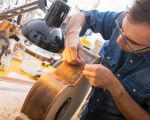How to Clean and Maintain Your Piano: A Step-by-Step Guide
1. Understanding the Importance of Regular Piano Maintenance
As a proud piano owner, I know that keeping my instrument in top condition requires a consistent maintenance routine. A well-maintained piano not only sounds better but also lasts longer. Whether you're a seasoned player or a beginner, learning how to clean and maintain your piano is crucial for preserving its quality and performance. Over the years, I've discovered a few simple yet effective techniques that help me maintain my piano, and today I’ll share them with you.
2. The Right Tools for the Job
Before we dive into the cleaning process, let's make sure you have the right tools. Having the proper cleaning supplies can make all the difference. I’ve learned from experience that using the wrong products or methods can actually harm the instrument. Here's a list of essentials:
- A soft, lint-free cloth
- Piano key cleaner (or a mild soap solution)
- A vacuum cleaner with a soft brush attachment
- A piano tuning wrench (for tuning purposes)
- A can of compressed air
- Piano polish or wood cleaner (for the exterior)
With these tools on hand, you'll be well-equipped to keep your piano clean and well-maintained. Now, let’s get started!
3. Cleaning the Piano Keys
One of the most noticeable areas of the piano is the keys, and cleaning them regularly is essential. I remember when I first got my piano, I was unsure about how to clean the ivory keys without damaging them. It’s important to note that some pianos have plastic keys, so it’s best to check your piano’s material before proceeding.
For ivory keys, I recommend using a soft, lint-free cloth dampened with a solution of mild soap and water. Gently wipe each key, ensuring that you don’t allow moisture to seep into the spaces between the keys. For plastic keys, you can use a slightly dampened cloth with water or a piano key cleaner. Avoid harsh chemicals, as they can damage the surface of the keys.
Don’t forget to dry the keys afterward with a clean, dry cloth to prevent any moisture from seeping into the piano mechanism.
4. Cleaning the Piano Exterior
Over time, dust and fingerprints can accumulate on the piano’s exterior. I’ve found that the best way to clean the wood is by using a soft cloth and a piano-specific wood cleaner. Be sure to read the label on the cleaner, as some products are formulated for particular types of wood finishes.
When cleaning the exterior, always move in the direction of the wood grain. I’ve learned that using circular motions can cause streaking or scratches. For stubborn dirt or fingerprints, a slightly dampened cloth works wonders, but make sure the cloth is only slightly wet. Never apply water directly to the wood surface, as it can damage the finish.
If you want to give your piano a shiny finish, apply a small amount of polish designed for pianos, and buff it gently with a soft cloth. This will help restore its natural beauty and keep it looking elegant.
5. Cleaning the Interior of the Piano
Cleaning the interior of the piano is something I always do carefully, as this is where the delicate mechanics and strings reside. To clean inside the piano, I use a vacuum cleaner with a soft brush attachment to remove dust from the strings, pedals, and soundboard. I make sure the vacuum is on a low suction setting to avoid damaging the strings or other sensitive parts.
Another tool I find essential is a can of compressed air. It’s perfect for blowing away dust from hard-to-reach places, like between the hammers and the action. When using compressed air, I always make sure to hold the can upright and use short bursts of air to avoid moisture buildup inside the piano.
Cleaning the inside of the piano can be tricky, and it’s easy to overlook areas. I recommend doing this step every few months, depending on how often you use the piano, to maintain the sound quality and prevent dust buildup that could affect performance.
6. Maintaining the Piano Pedals
Let’s not forget the pedals! I always make sure to clean them, as dust and dirt can affect their responsiveness. To clean the pedals, I use a soft cloth or a brush to remove any dirt that has accumulated around them. If the pedals are metal, I gently buff them with a microfiber cloth to maintain their shine.
Additionally, I always check for any squeaks or unusual sounds when pressing the pedals. If I notice anything, I usually take the time to clean and lubricate the mechanism carefully. It’s essential to ensure that the pedals are functioning smoothly to avoid any issues when playing.
7. Regular Tuning and Professional Maintenance
While cleaning is essential, regular tuning is just as important for your piano's upkeep. I personally schedule a professional tuning session every six months to ensure my piano remains in tune and sounds its best. Temperature and humidity changes can affect the piano’s tuning, so even if you don’t play often, it's important to tune it regularly.
In addition to tuning, I recommend having a professional technician inspect the piano every few years. They can check for any internal issues that may not be immediately noticeable, such as worn-out strings, action problems, or issues with the pedals.
8. The Importance of a Piano Cover
If you want to keep your piano in pristine condition for years, investing in a piano cover is a smart move. I’ve found that keeping my piano covered when not in use helps protect it from dust, sunlight, and accidental spills. Whether you opt for a fabric or vinyl cover, having one will reduce the frequency of cleaning and ensure your piano stays looking great.
9. Tips for Long-Term Piano Care
Maintaining your piano isn’t just about cleaning. It’s also about taking care of the overall environment where your piano is located. I always make sure to place my piano in a room with stable temperature and humidity levels. Extreme changes can cause the wood to expand or contract, which can affect the sound quality and tuning.
Avoid placing your piano near heaters, air conditioners, or windows where it may be exposed to direct sunlight or extreme temperatures. A stable environment ensures your piano stays in optimal condition for many years to come.
10. The Joy of a Well-Maintained Piano
As I’ve learned over the years, taking care of my piano is a rewarding process. Not only does it ensure that my instrument stays in top shape, but it also enhances my overall playing experience. A well-maintained piano sounds beautiful, feels great to play, and brings a sense of pride that comes from knowing I’ve taken the time to care for it.
Whether you're an amateur or a seasoned player, regular maintenance and cleaning will keep your piano looking and sounding its best for years to come. Don’t be afraid to get your hands a little dirty and enjoy the process – your piano will thank you for it!








